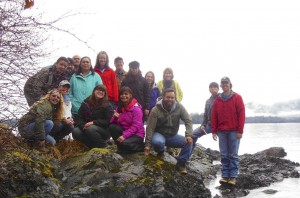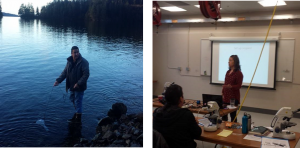Last October, two cases of paralytic shellfish poisoning (PSP) were confirmed after butter clams containing PSP toxins were harvested for personal consumption from a beach near Sitka, Alaska. Elevated PSP levels have prompted the state to close most southeast Alaska commercial shellfishery areas. However, recreational and subsistence shellfishers in the region remain at risk to get sick from PSP exposure in non-tested areas outside the commercial zones. Sitka and other southeast Alaskan communities have turned to NOAA for help in establishing HAB monitoring programs to address this problem.

Alaskan Tribal Natural Resource Specialists completed formal training as part of the first Southeast Alaska Tribal Toxins partnership (SEATT) workshop. Partners include the Sitka Tribe of Alaska, Tlingit and Haida Indian Tribes of Alaska, the Craig Indian Association, the Klawock Cooperative Association, the Yakutat Tlingit Tribe and the Petersburg Indian Association.

The main goal of this tribal phytoplankton monitoring is to serve as an early alert to subsistence shellfish harvesters of the potential for paralytic shellfish poisoning (PSP). Future workshops will focus on toxin determination, with the goal of transferring the recently approved Interstate Shellfish Sanitation Conference (ISSC) receptor binding assay to a centralized laboratory located in Sitka, Alaska. The series of workshops was sponsored by the Sitka Tribe of Alaska with funding from the EPA Indian General Assistance Program and the Administration for Native Americans, Environmental Regulatory Enhancement.
For additional information contact Steve.Morton@noaa.gov
